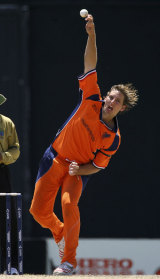An amateur solution in a professional world
Martin Williamson looks at the problems facing those who play for the Associates as the demands on their time increase while the rewards do not
Martin Williamson
13-Apr-2007
|
|

|
In itself, that's not earth-shattering news. He is just one of many players who will choose to bow out after the game's biggest tournament. The difference is that van Bunge is 24, talented, and represents the future for Netherlands cricket.
The reason he gave for his decision was that he could not commit the necessary time to play for his country as well as pursue a full-time job. That should set alarm bells ringing across all the Associates and within the offices of the ICC. There is a real danger that as the demands on part-time cricketers increase, more will decide that balancing those with other aspects of their lives is not practical.
Of the six leading Associates, only Kenya's players can be regarded as professional, in that most of them rely on income from cricket for their livelihoods. Bermuda, thanks to a generous, and almost certainly one-off, $11 million grant from their government, are paid but most retain jobs outside the game. The other four - Canada, Ireland, Netherlands and Scotland - are amateurs, most having full-time employment outside the game. What that means is that their players are reliant on their employers giving them time off to pursue what is effectively a hobby.
In the build-up to the World Cup - the zenith of the game for any cricketer - these players have been prepared to go the extra mile and make tremendous sacrifices to ensure they made it to the Caribbean. In many cases, that meant them taking unpaid leave, while for others boards paid employers what amounted to compensation for the time they were off. That is purely the financial impact and makes no allowance for the strain placed on families by extended absences.
Take Ireland. At the end of January they travelled to Nairobi to take part in the World Cricket League, from there they flew to Abu Dhabi for an Intercontinental Cup tie against UAE, and then on to the Caribbean. By the time they return home they will have been away for almost 12 weeks. Once back, they are into a full programme of National League matches in England, as well as a four-day Intercontinental Cup final against Canada to be sandwiched in sometime in May. Something has to give.
|
|
The flaw in the ICC's plan is that the increased demands have not been backed by additional funding. In the year ending April 30, 2007, Scotland were scheduled to play 46 days of cricket (including warm-ups for tournaments) as a national side; the numbers for the other Associates are similar - Bermuda 45, Canada 43, Ireland 42, Kenya 37, Netherlands 24. That does not include time spent preparing, travelling and acclimatising.
The direct funding they receive for that from the ICC amounts to US$215,000, of which $125,000 is not actually handed over to the boards but is retained by the ICC and used to offset other costs, such as paying for coaches and hosting training camps. Compare that with the lowest-ranked Full Member, Zimbabwe, who will receive around US$10 million with no requirement to account for how it is spent. In the same period, they had 37 days cricket scheduled. That really puts into perspective Ireland's achievement in Jamaica.
With the World Cup as the bait at the end of the hook, most players were happy to make the sacrifices, more so as 2006 was the first year that the Associates were given ODI status. But will that be the case year in, year out? Young cricketers will certainly be up for it, but the demands of careers and families will take a far earlier toll than they historically have.
As shown by a glance at most squad profiles, the Associates have tended to rely heavily on old heads, but the next generation of players are far less likely to take the financial and social hit that playing for their country involves, and that can only mean that standards drop, perversely leading to the exact opposite of what the ICC set out to achieve.
The other issue is that amateurs, who are making a bigger sacrifice, will inevitably be more inclined to let their hair down. One squad at the World Cup were renowned for their antics, getting hammered both on and off the pitch, and in the circumstances, it's hard to criticise them.
The Dutch, on the other hand, were younger and more motivated, and it was clear that a number of them saw the competition as a shop window for their talents and possible county contracts. While having players linked to first-class teams has to help boost standards, it presents other problems. Last summer, Eoin Morgan turned down an invitation to play for Ireland, preferring to remain with Middlesex. "I knew I had to take my county chance," he admitted, "because my working life is with them." He who pays the piper ...
But the overall issue is one that won't go away, and one that the ICC will have to address if van Bunge isn't to be the first of many to decide it's just not worth the sacrifice outside World Cup years - it is noticeable that his retirement might not be permanent, and it would not be a surprise if he and others were to return ahead of the 2011 tournament.
It needs some common sense with regard to scheduling and lots more money. Given the lucrative rights deals brokered by the ICC in recent months, money is one thing that it has in abundance. It just needs to use it wisely.
Martin Williamson is executive editor of Cricinfo